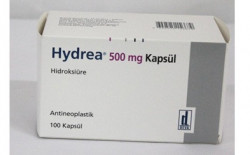Hydrea (hydroxyurea) Coupons, Discounts & Cost
Hydrea (hydroxyurea) is an anticancer drug. One way to save money on the Hydrea (hydroxyurea) retail cost regardless of income and insurance status is to use Hydrea coupons or discount cards from RXCoupons. Use our Hydroxyurea coupons at your online pharmacy and receive up to 75% off the sale price each time you refill your prescription.
Hydrea (hydroxyurea) - instructions for use
Hydrea (hydroxyurea) is an anticancer drug. It is used to treat malignant tumors of the head and neck (simultaneously with radiation therapy), polycythemia vera (erythremia), chronic myelogenous leukemia, osteomyelofibrosis, essential thrombocythemia, cervical cancer (simultaneously with radiation therapy), melanoma.
Hydrea (hydroxyurea) contraindications
Hydrea capsules have the following absolute contraindications: thrombocytopenia, leukopenia, pregnancy and lactation, children's age, hypersensitivity to the drug.
Hydrea is prescribed with caution in the presence of the following diseases and conditions: glucose-galactose malabsorption, lactose intolerance, lactase deficiency, severe anemia, renal or hepatic impairment, patients after chemotherapy or radiotherapy (due to the risk of acute radiation-induced skin reactions, myelosuppression).
Hydrea (hydroxyurea) dosage
Hydrea is taken orally. Patients may open the capsule, dissolve the contents into a glass of water and drink immediately. The dose is set individually. Patients should drink enough water during therapy.
Resistant chronic myeloid leukemia: 20-30 mg/kg daily (continuous therapy) for 1.5 months. Polycythemia vera: begin with 15-20 mg/kg per day. The dose is set individually. Essential thrombocythemia: the initial dose is of 15 mg/kg per day.
Carcinoma of the cervix, carcinoma of the head and neck: 80 mg/kg 1 time per day, in combination with radiation therapy every three days. In the absence of unusual toxicity after radiotherapy, the drug should be continued under strict medical supervision.
Patients with impaired hepatic function should not change the dose. Elderly patients should take the drug in doses not exceeding 60 mg/kg per day.
Hydrea (hydroxyurea) side effects
Nervous system: rarely - drowsiness, dizziness, disorientation, headache, seizures, hallucinations, peripheral neuropathy (in HIV-infected patients receiving antiretroviral therapy, such as stavudine and didanosine), fatigue. Urinary system: rarely - interstitial nephritis, urinary retention, dysuria. Respiratory system: rarely - pulmonary fibrosis, shortness of breath. Skin problems: rarely - cutaneous vasculitis, ulcers on the skin, peripheral erythema, facial erythema, hyperpigmentation, atrophy of skin and nails, cutaneous vasculitis syndrome (including gangrene and ulceration), skin cancer, alopecia. Digestive system: rarely - hepatotoxicity, pancreatitis (fatal in some cases - in HIV-infected patients receiving antiretroviral therapy, such as stavudine and didanosine), dyspepsia, stomatitis, diarrhea, anorexia, vomiting, nausea, constipation, erosion in the digestive mucosal surface, irritation or erosion of the stomach. Blood: rarely - myelosuppression (anemia, leukopenia, thrombocytopenia). Infections: rarely - gangrene. Other disorders: rarely - asthenia, allergic skin reactions, malaise, fever, dyspnea. Hepatotoxicity, pancreatitis (with possible fatal outcome), as well as severe peripheral neuropathy - these side effects are common for patients with HIV who take Hydrea simultaneously with antiretroviral drugs (in particular, with didanosine or stavudine). Additionally, Hydrea therapy can lead to mucositis, stomach discomfort.
Hydrea (hydroxyurea) Cautions
Hydrea may be used only under the supervision of a physician. Patients need to control the function of bone marrow before each course and during therapy (periodically). Hydrea may cause myelosuppression (most often - leukopenia, anemia and thrombocytopenia). Myelosuppression is the most common reaction in patients after chemotherapy or radiation therapy. The therapy should be stopped in case of severe violations of the digestive organs, such as nausea, vomiting, anorexia.
Hydrea may delay plasma iron clearance. The therapy should be stopped in case of progression of vasculitic ulcerations. Prolonged use of Hydrea in patients with polycythemia vera and thrombocythemia may result in secondary leukemia and skin cancer. Therefore, it is recommended to protect the skin from sunlight during Hydrea therapy.
The following effects may occur in case of combined therapy of Hydrea with some other drugs: - Other myelosuppressive drugs or radiation therapy may cause severe side effects; - Hydrea may increase the cytotoxic effect of Cytarabine; - Uricosuric medications may cause nephropathy.

